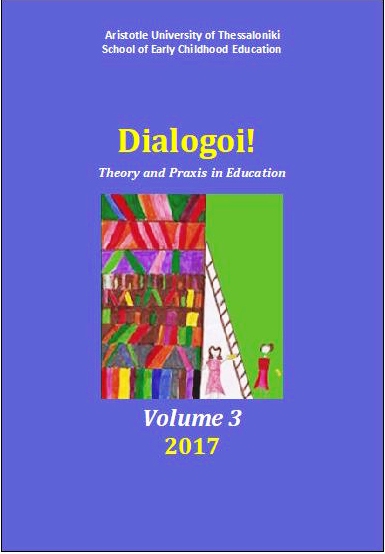It could be me – it could be you

Published:
Dec 12, 2017
Keywords:
a Drama in Education programme Theatre as Education teacher training refugees experiential activities
Abstract
“It could be me – it could be you” is an awareness raising project, aiming at the educational community; it focuses on human rights and refugee related issues, which are tackled through experiential learning activities, theatre techniques, as well as educational drama tools. The project is an outcome of the collaboration between the Greek office of the United Nations High Commissioner for Refugees (UNHCR) and the Hellenic Theatre/Drama & Education Network (TENet-Gr), the latter being responsible for the designing of the project. It was first implemented in 2015 and to this day it has a presence in many Greek cities. This article presents its theoretical framework, the seven main axes of activities it includes, some qualitative and quantitative elements, as well as an introductory evaluation to the project as a whole, to this day.
Article Details
- How to Cite
-
Choleva, A. (2017). It could be me – it could be you. Dialogoi! Theory and Praxis in Education, 3, 142–156. https://doi.org/10.12681/dial.15208
- Issue
- Vol. 3 (2017)
- Section
- Presentations of Innovative Programs

This work is licensed under a Creative Commons Attribution-NonCommercial-ShareAlike 4.0 International License.
Authors who publish with this journal agree to the following terms:
- Authors retain copyright and grant the journal right of first publication with the work simultaneously licensed under a Creative Commons Attribution Non-Commercial License that allows others to share the work with an acknowledgement of the work's authorship and initial publication in this journal.
- Authors are able to enter into separate, additional contractual arrangements for the non-exclusive distribution of the journal's published version of the work (e.g. post it to an institutional repository or publish it in a book), with an acknowledgement of its initial publication in this journal.
- Authors are permitted and encouraged to post their work online (preferably in institutional repositories or on their website) prior to and during the submission process, as it can lead to productive exchanges, as well as earlier and greater citation of published work (See The Effect of Open Access).
Downloads
Download data is not yet available.
References
Άλκηστις. (2008). Μαύρη αγελάδα - άσπρη αγελάδα. Δραματική τέχνη στην εκπαίδευση και διαπολιτισμικότητα. Αθήνα: Τόπος.
Boal, A. (1979). Theatre of the oppressed. London: Pluto Press.
Boal, A. (2008). Πολιτισμός & εκπαίδευση. Εκπαίδευση & Θέατρο, 9, 10-13.
Γκόβας, Ν. (2001). Για ένα νεανικό, δημιουργικό θέατρο. Αθήνα: Μεταίχμιο.
Γκόβας, Ν., & Ζώνιου, Χ. (Επιμ.) (2010). Θεατροπαιδαγωγικά προγράμματα με τεχνικές θεάτρου φόρουμ για την πρόληψη και την κοινωνική ενσωμάτωση. Αθήνα: Πανελλήνιο Δίκτυο για το Θέατρο στην Εκπαίδευση.
Διεθνής Οργανισμός Μετανάστευσης (IOM) & Ύπατη Αρμοστεία του ΟΗΕ για τους Πρόσφυγες (UNHCR). (2009). Εγχειρίδιο Δασκάλου "Δεν είναι μόνο αριθμοί". Εκπαιδευτικό υλικό για τη μετανάστευση και το άσυλο στην Ευρώπη (A. Jones, T. Keating, V. Saenen, & A. Roig, Επιμ. πρωτότυπου• Σ. Νάνου & Σ. Κουτσού, Επιμ. ελληνικής έκδοσης). Αθήνα: IOM/UNHCR.
Freire, P. (1972). Pedagogy of the oppressed. England: Penguin Books.
Gardner, H. (1983). Frames of mind: The theory of multiple iIntelligences. NY: Basic Books.
Λενακάκης, Α. (2015). Θεατροπαιδαγωγική και διαπολιτισμικότητα. Στο Κ. Μπίκος & Ε. Ταρατόρη (Επιμ.), Μελετήματα και ερωτήματα της παιδαγωγικής επιστήμης. Χαριστήριος τόμος στον ομότιμο καθηγητή Δημήτρη Χρ. Χατζηδήμου (σσ. 347-364). Θεσσαλονίκη: Κυριακίδης.
Νομικού, Μ., Ορφανίδου, Φ., & Χολέβα, Ν. (2014). Δραστηριότητες βιωματικής μάθησης στα ανθρώπινα δικαιώματα και στα δικαιώματα των προσφύγων. Αθήνα: UNHCR.
Πάντζου, Χ. (2013). Μετανάστευση και ρατσιστικός λόγος στα Μ.Μ.Ε. Ανακτήθηκε στις 4/12/2017 από http://tvxs.gr/news/egrapsan-eipan/i-xameni-nifaliotita-metanasteysi-kai-ratsistikos-logos-sta-mme-tis-xr-pantzoy
Rolandi-Ricci, Μ. (1996). Training teachers for intercultural education: The work of the Council of Europe. In Th. Dragonas, A. Frangoudaki, & Ch. Inglessi (Eds.), Beyond one’s own backyard: Intercultural teacher education in Europe. Athens, Greece: Nissos.
Santos, B. (2015). Σύγκρουση: το ερώτημα του θεάτρου φόρουμ. Εκπαίδευση & Θέατρο, 16, 36-39.
Slade, P. (1967). Child drama. England: University of London Press Ltd.
Somers, J. (1994). Drama in the curriculum. London: Cassell Educational Limited.
Vandenbroeck, M. (2004). Με τη ματιά του Γέτι. Η καλλιέργεια του σεβασμού του «άλλου» στην εκπαίδευση. Αθήνα: νήσος.
Ύπατη Αρμοστεία του ΟΗΕ για τους Πρόσφυγες. (2013). Περάσματα. Ένα παιχνίδι ευαισθητοποίησης για τη ζωή των προσφύγων (Ch. Barthélémy-Ruiz, B. Carpier, & N. Clément, Επιμ. πρωτότυπου• Μ. Τσαμουρά, Τομέας Ενημέρωσης του Γραφείου της Υ.Α. στην Ελλάδα, Μτφρ.). Αθήνα: UNHCR.
Χολέβα, Ν. (2010). Εσύ όπως κι εγώ. Εξερευνώντας τη διαφορετικότητα μέσα από το θέατρο. Αθήνα: Πανελλήνιο Δίκτυο για το Θέατρο στην Εκπαίδευση.


